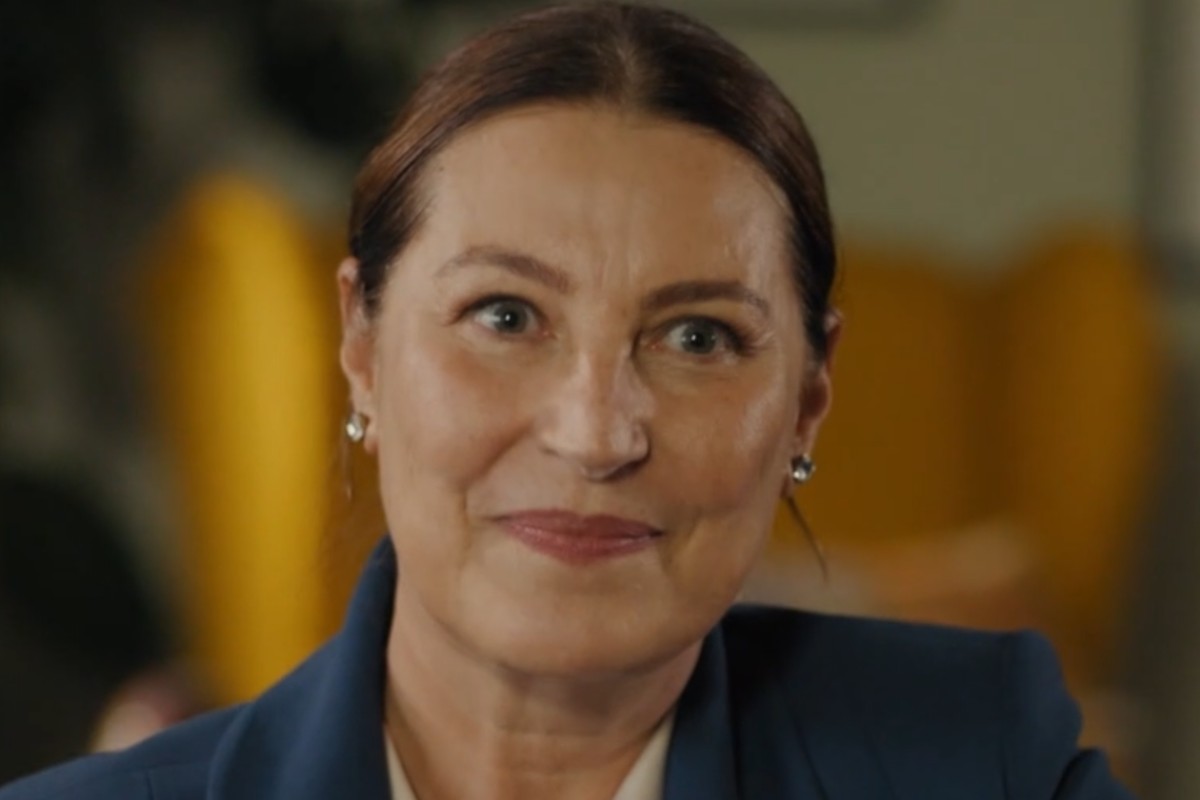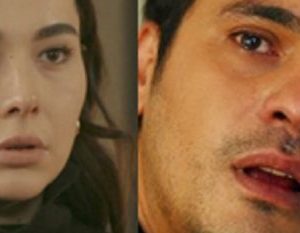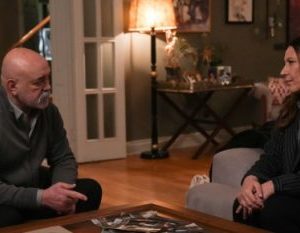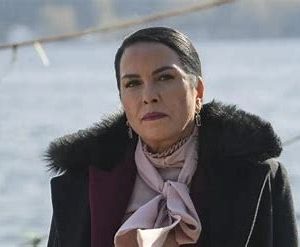For 30 years, Kahraman believed he knew the truth about his family. For 30 years, Mualla told him his father was her husband and his mother had abandoned him. But in mere seconds, the sight of a birthmark on Sezai’s shoulder—identical to his own, in the same position, with the same shape—shatters everything. Kahraman knows it can’t be a coincidence. The truth is about to emerge after decades of lies.
The episode opens with an unknown man appearing before Mualla, holding an old, yellowed newspaper article. His unnerving smile and voice betray his sinister intentions. Mualla immediately understands that trouble has arrived. The article contains secrets that could instantly collapse the entire reputation of the Dicleli family. It’s not just an old piece of paper; it’s a ticking time bomb. The blackmailer knows exactly what he holds and its immense value. His confidence stems from knowing his enemy’s weaknesses and how to strike where it hurts most. When he utters the name Kadri, Mualla’s blood runs cold. That name should be buried forever in the past, along with all the secrets it holds. But now it’s here, pronounced by a stranger using it as a weapon. Mualla knows that Kadri always brings enormous problems and devastating consequences for everyone.
The blackmailer quickly makes it clear that he isn’t just after money. While money is always useful, what he truly desires is to see the Dicleli family fall from their pedestal, humiliated, destroyed, reduced to nothing. His palpable hatred makes the situation even more dangerous. A blackmailer seeking only money can be bought, but one driven by revenge is unpredictable. Mualla desperately tries to remain calm, to hide the fear consuming her. She straightens her shoulders, raises her chin, attempting to project the air of superiority she always uses to intimidate others, but her eyes betray her completely. In them, the man reads all of Mualla’s terror, her full awareness of what could happen if the truth comes out. The threat hanging over Mualla isn’t just about her; it concerns Kahraman and everything he believes about his life, his family, his origins. He has built his identity on a story that could be completely false, and now someone has the power to destroy it all with a simple newspaper article. Mualla knows Kahraman isn’t prepared for this kind of shock. Kadri’s past is full of such explosive secrets that someone is willing to risk everything to exploit them. These aren’t normal secrets; they are ones that can change lives forever, involving births, paternity, and lies told for years. The blackmailer knows he holds something immense, making him even more determined to use it. The tension in the air becomes so thick that Mualla struggles to breathe. Every passing second makes the situation more dangerous. The man is in no hurry; he savors the moment, relishing the fear in Mualla’s eyes, knowing he has total control, which excites him. Mualla realizes she can’t face this alone but also doesn’t know who to turn to without risking making things worse. The blackmailer leaves, promising Mualla this is just the beginning. He hasn’t made specific demands or given ultimatums; he has only made it clear that he now knows everything and can use this information whenever and however he pleases. This makes it even more distressing because Mualla doesn’t know when the next blow will come. It could be tomorrow, in a month, or at the most inopportune moment. Mualla is left alone with her thoughts, acutely aware that her life has just changed forever. She has spent years constructing a version of reality that now threatens to collapse like a house of cards. She has lied, hidden, and manipulated the truth to protect herself and her position in the Dicleli family. But now all those lies could come back to haunt her. The article the man held contains details known only to a few people in the world. Details about Kadri, her past, her ties to the Dicleli family. Details that could explain why Kahraman has always doubted his family history. Details that could reveal connections no one ever imagined. This blackmail is just the first move in a much larger, more dangerous game. A game where every move can be decisive, where every secret can become a weapon, where every past lie can transform into a present bomb. Mualla knows Kadri’s secrets are more explosive than anyone can imagine, and now someone is about to use them against her.

Kahraman is returning home when he sees Mualla standing at the gate, her face pale, hands trembling slightly, eyes staring blankly as if she’d seen a ghost. He doesn’t need details to know something serious has just happened. His protective instincts immediately kick in. He doesn’t yet know what’s going on, but every fiber of his being tells him someone has just threatened his family. Mualla tries to compose herself when she sees him approaching, but it’s too late. Kahraman has already noticed her distress and knows it’s not the time for questions. It’s time to act. He approaches with determined steps, his eyes scanning the surroundings for any sign of danger. “Aunt, what happened?” Kahraman asks, his voice firm. Mualla tries to minimize it, saying it’s nothing important, but the tremor in her voice completely betrays her. Kahraman isn’t fooled; he’s known Mualla his whole life and knows it takes a lot to scare her this much. Something or someone has terrified her, igniting a rage he didn’t know he possessed. At that moment, he sees a figure swiftly walking away down the road, a man moving too fast with an unsettling demeanor. Kahraman’s instinct tells him that man is connected to Mualla’s state. He doesn’t hesitate, leaving his aunt and chasing the man with surprising determination.
The man notices he’s being followed and speeds up, but Kahraman is younger and fitter, easily catching up and blocking his path with a decisive move. “What did you want from my aunt?” he demands, his voice menacing. The man tries to move past him, claiming he doesn’t know what Kahraman is talking about, but Kahraman isn’t fooled. The confrontation becomes tense as the man realizes he can’t escape easily. He begins to speak arrogantly, implying he knows things that could ruin the Dicleli family. He talks about secrets, hidden truths, things best kept buried. But the more he talks, the more Kahraman’s rage grows. No one can threaten his family. When the man pronounces Kadri’s name with a wicked smile, something breaks inside Kahraman. His rage explodes with a force he didn’t know he possessed. It’s as if all the years of protecting his family concentrate into a moment of pure fury. He stops reasoning, acting purely on instinct. The first punch lands fast and precise. The man stumbles backward, but Kahraman doesn’t stop. He hits again mercilessly, without hesitation. Each blow is charged with his determination to protect his family’s honor. The man tries to defend himself, but Kahraman’s fury is too intense. “Listen to me,” Kahraman says, grabbing the man by the collar. His voice is low but laden with menace. “No one, and I mean no one, can touch the Diclelis. If I see you around here again, if I even hear that you’ve tried to contact anyone in my family, you’ll regret it for the rest of your life.” Kahraman’s words are clear and sharp as blades. He isn’t joking, and the man understands perfectly. The blackmailer sees a determination in Kahraman’s eyes that scares him more than the blows he’s received. He realizes he has underestimated the situation and is facing someone who isn’t afraid to use force to protect what he loves. The man seizes a moment of distraction to break free and flee. He runs as fast as he can, looking back to ensure Kahraman isn’t following him. But Kahraman lets him go. He knows the message has been delivered loud and clear. He also knows this isn’t the end of the story. Men like that don’t give up easily.
Kahraman returns to Mualla, his clothes a bit disheveled, knuckles sore. His aunt looks at him with eyes he’s never seen before—surprise, but also something resembling fear. Mualla had always known Kahraman was protective of the family, but she had never seen this side of him, never seen that dangerous determination in his eyes. “Don’t worry, Aunt,” Kahraman says, adjusting his jacket. “That man won’t bother you again.” But as he says these words, he knows he’s lying. He knows the man will return, perhaps not immediately, perhaps not directly, but he will return. Blackmailers never give up easily, especially when they know they have valuable information. Mualla observes her nephew with a new awareness. She always thought she knew him completely, but what she just witnessed revealed a side of Kahraman she never imagined existed. There’s a strength in him, a determination that can become dangerous if pushed to the limit, and this worries her as much as it reassures her. Kahraman has shown he’s willing to do anything to protect his family, even without knowing the details of the threat. He didn’t ask questions, he didn’t hesitate; he simply acted. This episode reveals his deeper character and suggests that the battles awaiting him might be harder than he imagined.
In the days following the incident with the blackmailer, Kahraman can’t get what happened out of his mind. For the first time in his life, he begins asking questions he never thought to ask before. The name Kadri echoes in his head like an unyielding sound. Who is this woman? Why did the blackmailer pronounce her name with such certainty? And most importantly, why did Mualla turn so pale when she heard it? The name Kadri stirs confused, fragmented memories in Kahraman that he can’t fully grasp. They are blurry images appearing and disappearing in his mind, too fast to catch, but clear enough to leave a sense of unease. He feels he’s heard that name somewhere before, at some point in his childhood, but every time he tries to recall the context, everything becomes hazy. He decides to confront Mualla directly with his questions. He finds her in the kitchen, mechanically preparing tea, as if her thoughts are elsewhere. “Aunt, who is Kadri?” Kahraman asks, his voice calm but determined. Mualla nearly drops the teapot. Her face suddenly tenses, and her eyes avoid meeting his. “Why do you ask?” Mualla replies with a question, a technique Kahraman recognizes as a delaying tactic. She used to do the same when he was a child and she wanted to avoid uncomfortable topics, but he’s no longer a child, and this evasion no longer satisfies him. “The man yesterday said that name, and you went white as a sheet. Who is this Kadri?”
Mualla tries to minimize it, saying she’s just someone from the past who isn’t important, someone not worth remembering. But the way she says it, the nervousness in her voice, the fact that she continues to avoid his gaze—all of it makes Kahraman even more suspicious. His aunt always had precise answers for every question, even when he was little. Now, she seems to be searching for words, as if each answer must be carefully weighed. “If she’s not important, why did that blackmailer mention her?” Kahraman insists. “And why did you react so badly?” Mualla turns to him with a forced smile that convinces neither of them. She says she was just surprised, that she didn’t expect to hear that name after so long, but Kahraman knows there’s more to it; he’s known his aunt his whole life and knows when she’s lying. Mualla’s evasive answers no longer convince him. Each explanation seems made up on the spot, as if she’s improvising a story without a clear destination. Kahraman begins to notice small inconsistencies in the stories Mualla has always told him about his childhood. Details that subtly change each time they talk about them, dates that don’t add up, people who disappear and reappear in the stories without logical explanation. His analytical mind, which has always helped him in his work, now begins to work on these family memories. He starts to piece together a puzzle he had never seen before, or rather, had never wanted to see. Every time he asked about his mother as a child, Mualla would become sad and change the subject. Every time he asked about his father, she always replied with the same phrase: “He was a good man, but fate took him away too soon.”
But now those phrases seem empty, memorized without real emotion. Kahraman begins to wonder if Mualla ever truly knew his parents or if everything she told him was an invention. The idea is so absurd that he tries to dismiss it, but the more he thinks about it, the more certain details begin to take on a different meaning. Every answer Mualla gives him now seems to hide something larger and more painful. When he asks her to tell him about his childhood again, she becomes nervous and tries to change the subject. When he asks if she has photos of his parents, she says they were lost in a move. When he asks if there are other relatives who might have known his mother, she replies that they all died before he was born. Doubt creeps into Kahraman’s heart like a slow but inexorable poison. It’s not a sudden, violent doubt, but a feeling that grows day by day, fueled by every conversation with Mualla that leaves more questions than answers. It’s as if someone planted a seed in his mind, and now that seed is growing, taking root deeper and deeper. He begins to observe Mualla with different eyes, noting how she avoids certain topics, how she becomes tense when someone mentions the past, how she always seems on guard as if fearing someone might ask the wrong questions. She has always been protective of him, but now this protection seems almost possessive, as if she’s afraid he might discover something he shouldn’t know. Kahraman understands that the truth about his family might be very different from what he has always believed. Perhaps his parents didn’t die in an accident, as he was always told. Perhaps his mother didn’t abandon him. Perhaps everything he knows about himself is built on lies that someone deemed necessary to tell him to protect him. But protect him from what? These first suspicions carve a deep furrow in his tranquility. With each passing day, the questions multiply, and Mualla’s answers become less and less convincing. Kahraman unconsciously prepares himself to discover truths that could completely change his perception of himself and his history.
Kahraman hurries up the stairs of the Dicleli house, worried by what he’s heard. Someone told him Sezai is packing his bags and intends to leave. The news deeply disturbs him because Sezai has always been an important figure in his life, almost like a second father. He can’t understand why he wants to leave the family now, when everyone needs to stick together. He arrives at Sezai’s bedroom door and knocks decisively. He wants clear answers. He wants to understand what’s happening and why no one told him sooner. His mind is full of questions that need immediate answers. He hears noises from inside—the sound of drawers opening and closing, of objects being moved quickly. “Sezai Amca, can I come in?” Kahraman asks through the door. The voice that answers from within sounds tired, as if Sezai is doing heavy work. “Come in, the door’s open.” Kahraman turns the handle and pushes the door open, preparing to see open suitcases and empty wardrobes that would confirm the rumors he’s heard. As Sezai fully opens the door to welcome him, fate decides to play its cruelest card. Sezai is wearing only a white tank top, the kind he usually wears for housework or when it gets too hot. It’s a perfectly normal, everyday scene, the kind of situation Kahraman has seen hundreds of times in his life, but this time it’s different. This time, something fatally draws his attention. Kahraman’s eyes fix on Sezai’s left shoulder, and in that moment, the whole world seems to stop. Time freezes, breath catches, everything that exists is reduced to that small, dark mark on Sezai’s skin. It’s a birthmark, a mole the size of a coin with irregular edges forming a peculiar, unmistakable shape. The birthmark Kahraman is looking at is identical to his own in every possible detail—not similar, not alike, but identical. The exact same position on the left shoulder, the same irregular shape, the same size, the same jagged edges. It’s as if someone took his birthmark and copied it perfectly onto Sezai’s skin. Or perhaps it’s the other way around. Kahraman’s heart begins to pound so hard he hears his blood pulsing in his ears like a wild drum. The sound is so intense that for a moment he fears Sezai might hear it too. His hands start to sweat, his mouth goes dry, and he feels a hollowness in his stomach he’d never experienced before. It’s the physical sensation of shock, the moment when reality completely changes shape. His rational mind desperately searches for a logical explanation for what he’s seeing. Maybe it’s just a coincidence. Perhaps birthmarks can be similar between people who are not blood relatives. Perhaps the room’s light is creating an optical illusion. But the more he looks, the more he knows he’s trying to lie to himself. Such precise coincidences simply don’t exist in nature. Sezai continues to speak normally, saying something about his travel plans, how long he’ll be away, when he expects to return; his voice reaches Kahraman like a distant, distorted sound, as if coming from another dimension. Sezai doesn’t notice Kahraman’s shocked gaze, doesn’t notice that the young man has gone pale as a ghost, doesn’t see his hands trembling slightly. Kahraman can barely maintain his composure as his world collapses around him like a sandcastle hit by a giant wave. Every certainty he had about his life, every story Mualla had told him, every memory of his childhood begins to waver and lose substance. If that birthmark means what he thinks it means, then everything he knows about himself could be a lie. He tries to answer Sezai normally, to ask the questions he came to ask about his travel plans, but the words come out with difficulty. His voice sounds strange even to his own ears. It’s as if he’s playing a part in a play, pretending to be the person he was 5 minutes before seeing that birthmark. The conversation lasts only a few minutes, but for Kahraman, it feels like hours. Every second is an eternity of questions multiplying in his head. How is this possible? How long has Sezai known? Is Mualla aware of all this? And most importantly, what does this mean for his identity, for everything he has always believed himself to be? When he finally manages to leave the room, Kahraman’s legs are trembling. He walks down the stairs slowly, leaning on the railing to avoid falling. His mind is a chaos of contradictory thoughts, of emotions he can’t control. In that moment, he understands that Sezai could be the father he never knew, the man Mualla had always told him died when he was little. This discovery marks the beginning of a search for the truth that he already knows will change everything forever. He can no longer pretend he didn’t see what he saw, he can no longer accept Mualla’s vague answers. He needs to know who he really is, where he comes from, what his true story is.
Kahraman opens the house door with hands still trembling from the shock of what he just discovered. The weight of that revelation crushes his chest like a stone, and he knows he can’t keep all this to himself. Oilum is the only person in the world with whom he can share such a devastating discovery, the only one who can help him make sense of what he saw. He needs her now more than ever. He needs her wisdom and support to face what might be the most difficult moment of his life. Oilum is in the living room watching television, but when she hears his footsteps, she turns to him with a smile that immediately fades. She doesn’t need words to understand that something terrible has just happened. Her husband’s face is completely distraught, paler than she’d ever seen him. His eyes have a lost expression, as if he just discovered that everything he believed was an illusion. Oilum turns off the television and immediately gets up from the sofa. “What happened?” Oilum asks, approaching him with concern. Kahraman looks at her for long seconds without being able to speak. How do you tell your wife that everything you’ve always believed about your family might be a gigantic lie? How do you explain that the man you’ve always considered almost like a father might actually be your biological father? The words seem insufficient to describe the enormity of what he has discovered. Kahraman sits heavily on the sofa and runs his hands through his hair in a gesture of pure despair. Oilum sits beside him and takes his hand, patiently waiting for him to find the strength to speak. She knows she can’t pressure him. She knows whatever happened is serious enough to have shaken him this way. The wait becomes heavy, charged with tension and fear for what she is about to hear. “Oilum, I saw something today that changed everything,” Kahraman finally begins, his voice breaking. “I went to Sezai to talk to him about his travel plans, and when he opened the door, he was only wearing a tank top.” Oilum looks at him without understanding where he’s going, but remains silent to let him speak. “I saw his shoulder, Oilum, I saw his birthmark.” The words come out with difficulty, as if each syllable is a weight Kahraman has to lift with enormous effort. “It’s identical to mine—not similar, not alike. Identical. Same position, same shape, same size. It can’t be a coincidence.” Oilum remains completely motionless, as if time has stopped. Her eyes slowly widen as the meaning of her husband’s words begins to penetrate her mind. The silence that follows is so dense it seems tangible. Oilum stares at Kahraman for long seconds, trying to process what she has just heard. Her rational mind tries to find alternative explanations, but she knows her husband would never tell her something like this unless he was absolutely sure of what he saw. Birthmarks don’t lie, especially when they are identical in every detail. “Are you sure of what you saw?” Oilum finally asks, her voice barely audible. Kahraman nods slowly, his eyes full of pain. “I looked at that mark for at least 10 seconds. It’s like someone took my birthmark and copied it perfectly onto his skin. There’s no doubt. Oilum, Sezai could be my father.”
Oilum’s reaction is a mixture of disbelief and deep concern for what this discovery could mean for them. It’s not just a matter of paternity; it’s something that could completely upset the balance of the Dicleli family. If Sezai is truly Kahraman’s father, this means Mualla has lied for 30 years, that their entire known history is false, that Guzide will have to face the fact that her husband had a child with another woman. “But how is it possible?” Oilum whispers. “Mualla always told you your father died when you were little. How can it be Sezai if he was always married to Guzide?” Kahraman shakes his head, his hands trembling slightly. “I don’t know, I just know what I saw, and I know that identical birthmarks between two people who are not blood relatives simply don’t exist.” Oilum tries to be the voice of reason, to find alternative explanations that can make sense of all this without destroying their certainties, but she also knows that such precise coincidences are impossible. She has studied enough to know that birthmarks have specific genetic characteristics and that the probability of two unrelated people having identical marks is practically zero. Together, they begin to rethink all the moments they interacted with Sezai over the years, looking at every memory with completely new eyes. The moments when Sezai seemed particularly affectionate with Kahraman, the times he looked at him with a strange expression, the protective gestures that seemed to go beyond normal family affection. Everything begins to take on a different, much deeper meaning. The conversation leads them to question everything they thought they knew about Kahraman’s family. If Sezai is his father, who is his mother? Is she really dead, as he was always told? And Kadri, the name the blackmailer had pronounced, could she be his mother? The questions multiply without finding answers, creating a labyrinth of doubts and terrifying possibilities. “Whatever we discover, we will face everything together,” Oilum says, taking his face in her hands. “No matter how painful the truth may be, I will always be by your side.” Her words are firm, resolute, charged with all the love and support she can offer. Kahraman feels a weight lift from his chest; at least he is not alone in this battle for truth. Their marriage strengthens in the face of this crisis, preparing them for the challenges they know await them. They will have to confront decades-old lies, secrets that could destroy families, truths that no one wants to hear, but they will do it together as a united team against everything fate decides to put in their path.
After discovering the truth about the birthmark, Kahraman begins to rethink Mualla’s behavior over the years with a completely different perspective. Every gesture, every decision, every moment of affection he remembers from his childhood now takes on a sinister and disturbing light. The woman he had always considered a second mother, the one who had raised him with love and dedication, may have had very different motivations than he had always imagined. The suspicions about Sezai lead him to question the true reasons why Mualla took him in when he was little. It was no longer possible to believe the romantic version of the good aunt who saves the orphaned nephew out of pure family love. If Sezai was really his father, then the entire story Mualla had told him was an elaborate construction to hide a much more complex and probably much more self-serving truth. The wealth and power of the Dicleli family begin to seem like the real driving force behind Mualla’s actions. Kahraman now remembers with crystalline clarity all those childhood moments when his aunt seemed particularly interested in the family’s financial matters. When there were discussions about assets, properties, investments, Mualla was always present, always attentive, always ready to give unsolicited advice on how to best manage the Diclelis’ wealth. He remembers family dinners where Mualla asked apparently innocent questions about the value of properties, bank accounts, investment projects. At the time, he thought it was just family curiosity, a normal aunt’s interest in the economic well-being of relatives. Now, those questions take on a completely different meaning. They seem like calculated moves by someone who was studying the situation to gain the maximum possible advantage. The attention Mualla had always shown him might not have been dictated by genuine love, but by a precise and ruthless calculation. Raising Sezai’s secret child meant having a winning card to play at the right moment. It meant having privileged access to the richest and most powerful family in the area. It meant being able to influence important decisions through the emotional control she had over Kahraman. The story Mualla had always told him about his mother begins to seem artificially constructed. Too perfect to be true: the mother who died in tragic circumstances, the father he could never know, the generous aunt who sacrificed herself to raise him. It was a narrative that played on emotions, that prevented uncomfortable questions, that created a debt of gratitude impossible to repay. A story that put Mualla at the center as the savior, as the only person who truly cared about his well-being. Every memory of his childhood now takes on a different and deeply painful meaning. Moments of tenderness might have been acted. Concerns for his future might have been concerns for her own future. The tears shed during stories about his family might have been crocodile tears. Kahraman feels the ground under his feet giving way, that everything he had built his life upon is crumbling.





